Chronotropic heart rate - Study guides, Class notes & Summaries
Looking for the best study guides, study notes and summaries about Chronotropic heart rate? On this page you'll find 567 study documents about Chronotropic heart rate.
Page 2 out of 567 results
Sort by
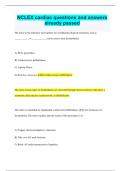
-
NCLEX cardiac questions and answers already passed
- Exam (elaborations) • 31 pages • 2024
- Available in package deal
-
- $10.99
- + learn more
NCLEX cardiac questions and answers already passed The nurse in the telemetry unit explains two nonpharmacological treatments such as ___________, or ___________, can be used to treat dysrhythmias. A) ECG; pacemaker B) Cardioversion; defibrillation C) Aspirin; Plavix D) Exercise; stress test B) Cardioversion; defibrillation The more serious types of dysrhythmias are corrected through electrical shock of the heart, a treatment called elective cardioversion, or defibrillation. ...
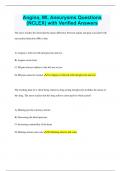
-
Angina, MI, Aneurysms Questions (NCLEX) with Verified Answers
- Exam (elaborations) • 25 pages • 2024
- Available in package deal
-
- $9.99
- + learn more
Angina, MI, Aneurysms Questions (NCLEX) with Verified Answers The nurse teaches the client that the major difference between angina and pain associated with myocardial infarction (MI) is that: A) Angina is relieved with nitroglycerin and rest. B) Angina can be fatal. C) MI pain always radiates to the left arm or jaw. D) MI pain cannot be treated. A) Angina is relieved with nitroglycerin and rest. The teaching plan for a client being started on long-acting nitroglycerin includes the...
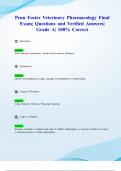
-
Penn Foster Veterinary Pharmacology Final Exam| Questions and Verified Answers| Grade A| 100% Correct
- Exam (elaborations) • 15 pages • 2024
-
Available in package deal
-
- $10.49
- + learn more
Penn Foster Veterinary Pharmacology Final Exam| Questions and Verified Answers| Grade A| 100% Correct Q: Mucolytics Alter mucous composition - breaks down mucous thickness Q: Antitussives Answer: inhibits non productive cough, example is butorphanol or hydrocodone Q: 4 types of Diuretics Answer: Loop, Osmotic, Thiazine, Potassium Sparing Q: Loop vs. Osmotic Answer: Increase excretion of sodium and water to inhibit reabsorption vs increase excretion of w...
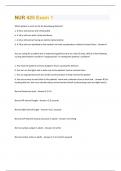
-
NUR 425 Exam 1 (Questions + Answers) Solved
- Exam (elaborations) • 47 pages • 2024
-
- $8.39
- + learn more
Which patient is most at risk for developing delirium? a. A 50-yr-old woman with cholecystitis b. A 19-yr-old man with a fractured femur c. A 42-yr-old woman having an elective hysterectomy d. A 78-yr-old man admitted to the medical unit with complications related to heart failure - Answer-D You are caring for a patient who is experiencing delirium due to a lack of sleep. Which of the following nursing interventions would be *inappropriate* in treating this patients' condition? a. You tr...
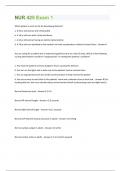
-
NUR 425 Exam 1 latest questions and answers all are correct graded A+
- Exam (elaborations) • 47 pages • 2024
- Available in package deal
-
- $8.39
- + learn more
Which patient is most at risk for developing delirium? a. A 50-yr-old woman with cholecystitis b. A 19-yr-old man with a fractured femur c. A 42-yr-old woman having an elective hysterectomy d. A 78-yr-old man admitted to the medical unit with complications related to heart failure - Answer-D You are caring for a patient who is experiencing delirium due to a lack of sleep. Which of the following nursing interventions would be *inappropriate* in treating this patients' condition? a. You tr...
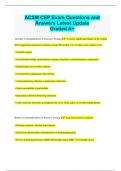
-
ACSM CEP Exam Questions and Answers Latest Update Graded A+
- Exam (elaborations) • 28 pages • 2024
- Available in package deal
-
- $9.99
- + learn more
ACSM CEP Exam Questions and Answers Latest Update Graded A+ Absolute Contraindications to Exercise Testing • A recent significant change in the resting ECG suggesting significant ischemia, recent MI (within 2 d), or other acute cardiac event • Unstable angina • Uncontrolled cardiac dysrhythmias causing symptoms or hemodynamic compromise • Symptomatic severe aortic stenosis • Uncontrolled symptomatic heart failure • Acute pulmonary embolus or pulmonary infarction • A...
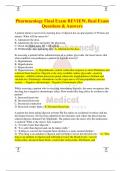
-
Pharmacology Final Exam REVIEW, Real Exam Questions & Answers, 2024
- Exam (elaborations) • 30 pages • 2024
-
Available in package deal
-
- $13.64
- + learn more
Pharmacology Final Exam REVIEW, Real Exam Questions & Answers, 2024-A patient about to receive his morning dose of digoxin has an apical pulse of 70 beats per minute. What will the nurse do? A. Administer the dose. B. Administer the dose and notify the physician. C. Check the radial pulse for 1 full minute. D. Withhold the dose and notify the - A. Administer the dose. In assessing a patient before administration of a cardiac glycoside, the nurse knows that what condition can predispose a ...
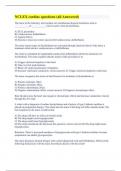
-
NCLEX cardiac questions (all Answered)
- Exam (elaborations) • 13 pages • 2024
-
Available in package deal
-
- $10.99
- + learn more
The nurse in the telemetry unit explains two nonpharmacological treatments such as ___________, or ___________, can be used to treat dysrhythmias. A) ECG; pacemaker B) Cardioversion; defibrillation C) Aspirin; Plavix D) Exercise; stress test correct answers B) Cardioversion; defibrillation The more serious types of dysrhythmias are corrected through electrical shock of the heart, a treatment called elective cardioversion, or defibrillation. The client is scheduled for implantable car...
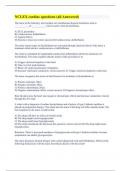
-
NCLEX cardiac questions (all Answered)
- Exam (elaborations) • 13 pages • 2024
-
Available in package deal
-
- $10.99
- + learn more
The nurse in the telemetry unit explains two nonpharmacological treatments such as ___________, or ___________, can be used to treat dysrhythmias. A) ECG; pacemaker B) Cardioversion; defibrillation C) Aspirin; Plavix D) Exercise; stress test correct answers B) Cardioversion; defibrillation The more serious types of dysrhythmias are corrected through electrical shock of the heart, a treatment called elective cardioversion, or defibrillation. The client is scheduled for implantable car...
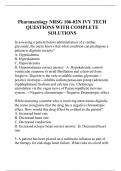
-
Pharmacology NRSG 106-02N IVY TECH QUESTIONS WITH COMPLETE SOLUTIONS
- Exam (elaborations) • 32 pages • 2023
-
Available in package deal
-
- $15.99
- + learn more
In assessing a patient before administration of a cardiac glycoside, the nurse knows that what condition can predispose a patient to digitalis toxicity? A. Hypokalemia B. Hyperkalemia C. Hypocalcemia D. Hypernatremia correct answer: A. Hypokalemia; control ventricular response to atrial fibrillation and a derived from foxglove. Digoxin is the only available cardiac glycoside---positive inotropic---inhibits sodium potassium pump (adenosine tripphophatase) Sodium and calcium rise. Cholinergic...

Study stress? For sellers on Stuvia, these are actually golden times. KA-CHING! Earn from your study resources too and start uploading now. Discover all about earning on Stuvia


